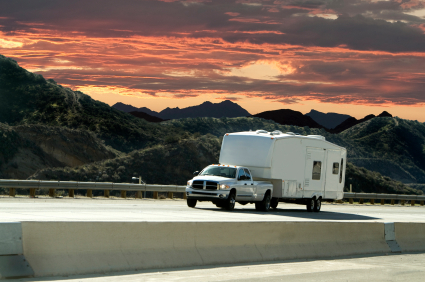Trailer Insurance for What You Tow
How trailers are insured, how to insure a personal and commercial trailer, and why it’s important to make sure your trailer contents are insured too.
There are a myriad of reasons to have a trailer. They can be strictly commercial, strictly for pleasure, or a little of both. Regardless of what they’re used for, however, they should be insured just like your other vehicles.
While they do carry some coverage simply by being towed, this is often not enough. You may need trailer insurance. Insuring a trailer is a simple thing to do once you know what the insurance company needs.
How Trailers are Insured
The single most important thing to remember about trailers is that you have to insure them separately from your vehicles. Because trailers are not self-propelled vehicles by themselves, they do not qualify for liability coverage. Instead, they are eligible for full coverage only.
Many trailers are insured on a stated value basis. That is you tell the insurance company how much it’s worth and they insure it for that amount (less depreciation, of course). It’s a fairly simple process.
Insuring a Personal Trailer
It’s very easy to spend tens of thousands of dollars on a nice recreational vehicle trailer. Why would you not insure it? Remember, when it comes to your trailer your vehicle’s coverage only extends to liability. Even if the vehicle towing the trailer has the best zero deductible full coverage available, if you’re in an accident and the trailer is not covered separately, there’s no coverage on that trailer. Obviously, you want to insure it.
Depending on the company, recreational vehicle trailers may be insured at actual cash value (i.e. the amount the trailer is worth at that particular point in time) or stated value. Consult with your insurance agent to for more information specific to your company.
Insuring a Commercial Trailer
If anything, commercial trailers are even more straightforward to insure. You provide the insurance company with the year, make, serial number and value of the trailer and they insure it at the desired deductible. That’s pretty much it. Since many commercial trailers tend to be pretty basic (seriously, how much more basic can a vehicle be than a flatbed trailer?) premiums to insure them tend to be quite reasonable.
As with other commercial vehicles, don’t forget to notify your insurance agent of any changes as soon as they occur to keep your coverage current. Add a trailer as soon as you acquire it, and drop a trailer as soon as you get rid of it.
Don’t Forget Your Tools and Toys
In addition, any contents loaded in or on that trailer have to be insured separately as well, usually on a so-called “inland marine” policy. This includes work trailers as well as recreational trailers such as those used to transport boats, snowmobiles or jet skis.
Remember as a general rule an auto insurer only insures those things on a vehicle that are factory installed and bolted down. Trailer contents need to be insured separately to avoid any gaps in coverage should theft or any other loss occur.
How trailers are insured, how to insure a personal and commercial trailer, and why it’s important to make sure your trailer contents are insured too.
There are a myriad of reasons to have a trailer. They can be strictly commercial, strictly for pleasure, or a little of both. Regardless of what they’re used for, however, they should be insured just like your other vehicles. While they do carry some coverage simply by being towed, this is often not enough.
Insuring a trailer is a simple thing to do once you know what the insurance company needs.
How Trailers are Insured
The single most important thing to remember about trailers is that you have to insure them separately from your vehicles. Because trailers are not self-propelled vehicles by themselves, they do not qualify for liability coverage. Instead, they are eligible for full coverage only.
Most trailers are insured on a stated value basis. That is you tell the insurance company how much it’s worth and they insure it for that amount (less depreciation, of course). It’s a fairly simple process.
Insuring a Personal Trailer
It’s very easy to spend tens of thousands of dollars on a nice recreational vehicle trailer. Why would you not insure it? Remember, when it comes to your trailer your vehicle’s coverage only extends to liability. Even if the vehicle towing the trailer has the best zero deductible full coverage available, if you’re in an accident and the trailer is not covered separately, there’s no coverage on that trailer. Obviously, you want to insure it.
Depending on the company, recreational vehicle trailers may be insured at actual cash value (i.e. the amount the trailer is worth at that particular point in time) or stated value. Consult with your insurance agent to for more information specific to your company.
Insuring a Commercial Trailer
If anything, commercial trailers are even more straightforward to insure. You provide the insurance company with the year, make, serial number and value of the trailer and they insure it at the desired deductible. That’s pretty much it. Since many commercial trailers tend to be pretty basic (seriously, how much more basic can a vehicle be than a flatbed trailer?) premiums to insure them tend to be quite reasonable.
As with other commercial vehicles, don’t forget to notify your insurance agent of any changes as soon as they occur to keep your coverage current. Add a trailer as soon as you acquire it, and drop a trailer as soon as you get rid of it.
Don’t Forget Your Tools and Toys
In addition, any contents loaded in or on that trailer have to be insured separately as well, usually on a so-called “inland marine” policy. This includes work trailers as well as recreational trailers such as those used to transport boats, snowmobiles or jet skis.
Remember as a general rule an auto insurer only insures those things on a vehicle that are factory installed and bolted down. Trailer contents need to be insured separately to avoid any gaps in coverage should theft or any other loss occur.





